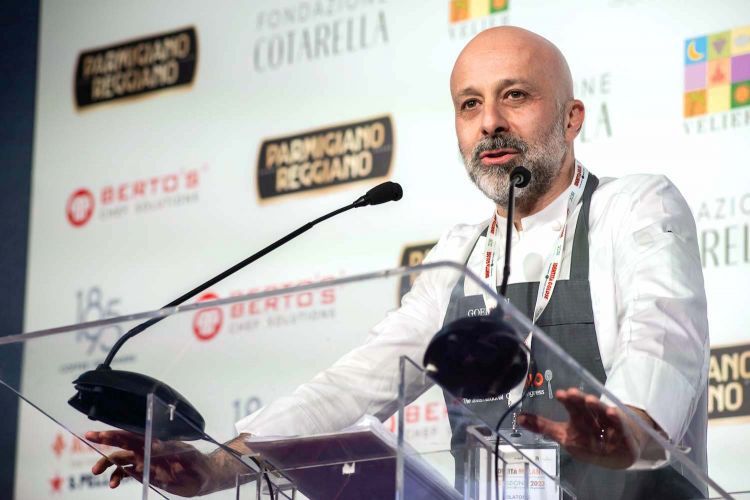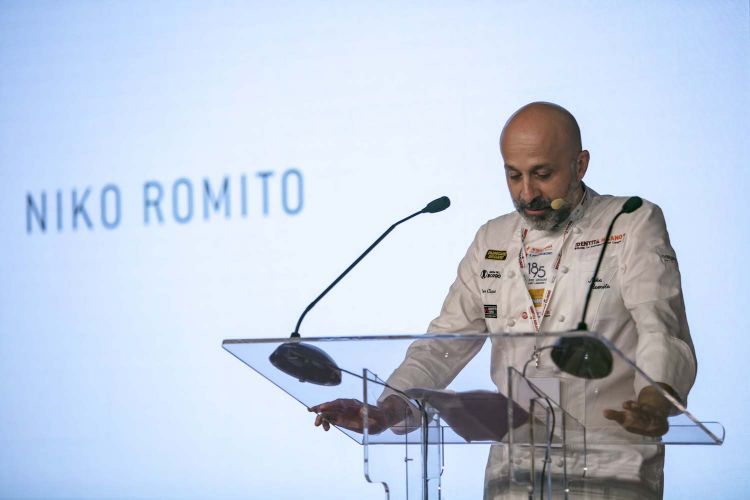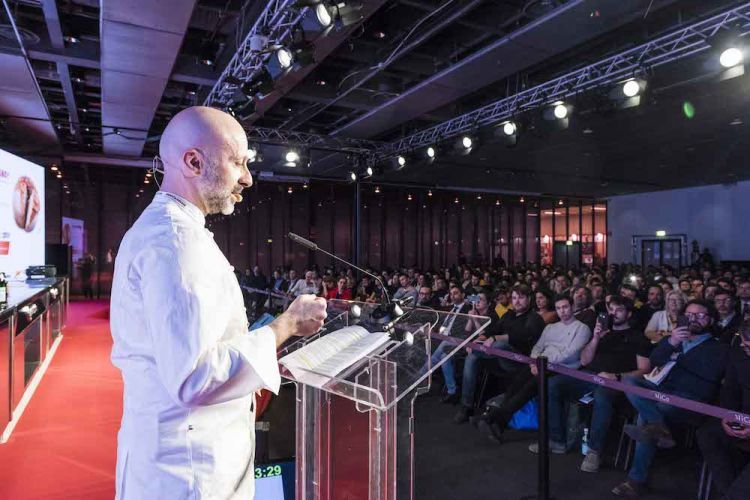"My professional life, ever since I started, has been all about disobedience": this is how Niko Romito answers, with a smile that can also be detected by listening to his voice through a telephone, when we ask him if he feels in any way involved in the theme chosen for the 19th edition of the Identità Milano Congress, scheduled from the 9th to 11th of March. There is no innovation without disobedience - Revolution today: in this presentation, our director Paolo Marchi talked about the sense and intentions of this new theme for the congress.
For many editions of Identità Milano, and it could not be otherwise, Niko Romito has been a constant in the programme, in this 19th edition too. He will hold the first lesson on Monday 11th March, in the afternoon, from 2:30 pm. Of course will not anticipate the content of his masterclass, but as we get closer and closer to the start of this year's three-day event, we interviewed him to listen to his point of view on the cue that we will propose to the over 100 speakers who will take turns on the MiCo stages.
For those who know the early days of Romito's career as a chef - before the Michelin stars for Reale Casadonna, before the establishments that are now part of his constellation such as Spazio, ALT, the restaurants in the Bulgari hotels - that reference to the disobedience of the early days is clear: it is the story of a student at the university in Rome who, on his way to Rivisondoli to close down, in agreement with his family, the trattoria run by his recently deceased father, decides instead to take over together with his sister Cristiana, and try his hand as a self-taught cook, gradually turning it into a restaurant until it gained three stars in less than 15 years.
"When I decided to do this job, I first disobeyed the idea I had had of my future until the day before, which was to be a financial broker, never having cooked in my life. But with that choice I also went against the pressure of my family, who thought it would be very difficult to continue running the trattoria in Rivisondoli, which was considered to have no future. It was a first step of total disobedience."

Romito at Identità Milano 2023
If I think about my career, I believe disobedience in cooking came later, simply because you cannot disobey something, or make innovation, without knowing the rules, the techniques, the cooking procedures... You cannot transgress if you do not understand the language that others have written before you. In the early years, my job was to study and, above all, to copy what others had done, trying to do it in the best way possible. Being self-taught, that’s all I could do, study, read manuals, copy: it was necessary. At a certain point in my career, with a gastronomic vocabulary that I thought could be interesting, I started to disobey, writing and trying to make something that did not belong to the gastronomic literature of the past but represented my vision of transformation.
How important is the concept of innovation for you?
I believe that innovation is the essential lymph for me: I live off creativity and research. Those who know me well, who have seen my path, know that it has always been characterised by choices in which innovation played a crucial role, together with hard work and constant research. After all, when I think back to when the three stars arrived, I could have stopped, rested a little on my laurels, while that goal gave me strength, responsibility, but also the awareness that I could say and do something truly innovative. For me, innovation is pure energy. It is the petrol in my engine. This also means taking many risks because disobeying and innovating require brave choices. Today, it's easier, because I have much more experience, awareness, and ability to communicate my innovations, compared to my first steps: when I decided to move Reale from Rivisondoli to Castel di Sangro, for example, I took a huge risk. But I was convinced, perhaps with a hint of presumption, that I could create a place capable of attracting many people, and I knew that to succeed, I had to innovate and write something that was uniquely mine.

The innovation I mentioned earlier is lifeblood for me, but then it becomes energy for the whole group working alongside me: it certainly happened when in April two years ago I chose to propose a tasting menu composed of fifteen entirely vegetal dishes. Something that had never been done in a three-star restaurant, so it was a strong, disruptive, courageous choice, which, from my point of view, reaffirmed the central role of innovation and research in my way of interpreting this work.
And among your colleagues? Who more than others made you think you were facing a real innovation?
I'll start in the distant past, because I'm happy to remember that moment: it was 2003, my kitchen was still very simple, and nobody knew me. It was a time when, to improve, I was taking two or three-day cooking courses and at the end of one of these courses I dined at Massimiliano Alajmo's, at Le Calandre. After dinner, I got in the car to drive home and I remember that I had a thousand ideas in my head, I was aware of how much I still had to grow, but also of how many beautiful things I could do. That dinner gave me a new vision of where taste and cooking could go. I also recall my experience in Copenhagen, in 2012, at Renè Redzepi's first Noma. I was struck by many things there: the idea of team, research and training, the service model and the timing of the dishes, and the all-embracing experience one had from entering the restaurant until the end of the meal. Finally, without going into the quality of the food, I must say that the choice of Eleven Madison Park in New York to move, at the height of its success, from a cuisine that dealt with a wide variety of ingredients to an entirely vegan proposal was a great demonstration of strength and courage. But it was a choice that required strong concepts, to support the disruptive choice of a chef who wants to take an entirely new direction, is riskier and more strenuous than the previous one.

I would say both. In daily work, in the repetition of work on certain ingredients, it can happen that a new idea comes from a mistake, or from a particular tasting. But especially in the work on vegetables, which represents a completely new language for me, I applied a different process: in this context I had no influence whatsoever, but I made an effort to think about an ingredient to try to take it in directions that, on paper, might seem crazy. Techniques that, in thinking about them, make you fear destroying that ingredient. But I believe completely new ideas can be born from that destructive process, and I can find those unprecedented, creative answers that I am constantly searching for.
CLICK HERE FOR THE FULL PROGRAMME OF IDENTITÀ MILANO 2024
CLICK HERE TO REGISTER
Translated into English by Slawka G. Scarso